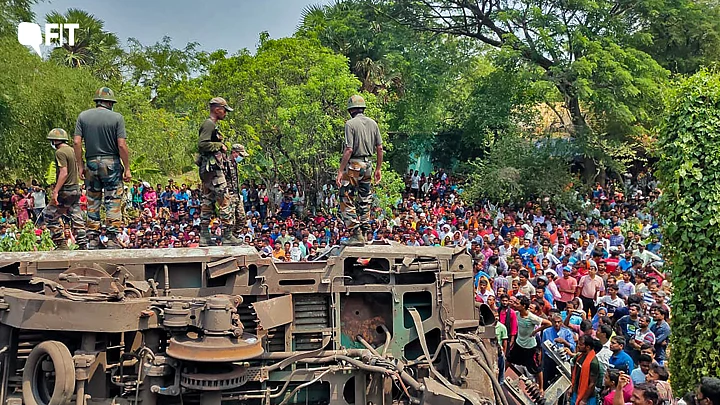"I survived the most dangerous train derailment in recent times. But the visuals keep reappearing in my mind. I have reached out for help and hope things will get better soon."Anubhav Das (28), PhD Scholar to The Quint's My Report earlier this week
Twenty-eight-year-old Anubhav Das was on board the Coromandel Express on the evening of Friday, 2 June, when it derailed and crashed with two other trains, causing the loss of at least 288 lives.
While he did survive the accident, he's been getting flashbacks of the event ever since. In multiple accounts to the media, survivors have talked about how the incident has left them "shaken to the core."
People who've lost family members in the accident have also spoken about how they wish they would have been there instead of their parents, partners, siblings, or children.
FIT spoke to mental health experts to understand the impact such traumatic events have on those who've survived them.
What Is Post-Traumatic Stress Disorder?
The Centers for Disease Control and Prevention define Post-Traumatic Stress Disorder (PTSD) as "an intense physical and emotional response to thoughts and reminders of the event that last for many weeks or months after the traumatic event."
The National Center for PTSD in the United States had estimated in a study that six out of every 100 people suffer from PTSD at some point in their lives.
PTSD can show up in people in many different ways, but most commonly its symptoms will be visible within a few months of the traumatic event.
For instance, someone who was travelling in the Coromandel Express on the day of the accident might get flashbacks anytime they see or hear about a train, with unresolved emotions coming to the fore. They might also shudder to even think of travelling by train the next time.
Dr Fabian Almeida, Consultant Psychiatrist at Kalyan's Fortis Hospital, says that someone struggling with PTSD might also get triggered seeing graphic visuals of the incident in the news media, which could be detrimental for their psychological health in the long term too.
A very common response to PTSD is also survivor's guilt. It might not manifest in everyone suffering from PTSD, but it normally leads to emotional disturbance.
Survivor's Guilt: Part & Parcel of PTSD
Dr Dhanya Chandran, Consultant – Clinical Psychology, at Kochi’s Amrita Hospital, tells FIT:
"Survivor's guilt is seen in people going through traumatic events. These people tend to feel emotional distress. They start having thoughts such as – why did I not suffer more, why was I spared, why did I have to see all this, why couldn’t I do more to save people."Dr Dhanya Chandran
A 2022 study titled Survivor Guilt: A Cognitive Approach, published in the National Library of Medicine, talks about how survivors feel "they have benefitted unfairly" by being alive, when someone else has lost their life.
It also mentions how "survivors (are) caught in a continual battle to make sense of their survival, leading to persistent guilt and feelings of disentitlement to life."
Dr Almeida concurs. He adds that following any unnatural event, especially if you've lost someone you knew, survivor's guilt haunts you in different ways.
"It might make you wish that either both of you had died or both would have been saved. It is difficult to accept the situation and leads to guilt. But like grief, it is normal," says Dr Almeida.
What PTSD & Survivor's Guilt Manifest As
Though PTSD and survivor's guilt show up in different forms in people, depending on the intensity of their experience and the kind of cognitive/emotional distress they're going through, some common behaviours might include:
Negative emotions and thoughts
Irritability and brooding
Regret and grief
Disturbed mental state
Nightmares
Crying
Shock or numbness
Anxiety
Palpitations
Restlessness and helplessness
Fear and confusion
Lack of sleep and appetite
Anxiety and panic attacks
Repeated thoughts/memories/flashbacks of the event and what more the person could have done
Disconnection with immediate reality
'History of Trauma, Psychological Issues': Who's More Prone To PTSD
While PTSD is common, not everyone who goes through a traumatic incident experiences it. There are certain factors that can increase the risk of someone struggling with PTSD and survivor's guilt. These may include:
People directly in the frontline who saw devastation up close
People already suffering from psychological conditions like depression and anxiety
Someone already going through a tough time in their life
Someone with a history of trauma
People struggling with substance abuse of any kind
People with social anxiety or no support network
What You Can Do
If you've gone through an abnormal event, it's normal to have adverse, heightened emotions after that, says Dr Chandran. But there are some things you can do to help you cope.
Talk about your emotions and experience with someone.
Find an active support system that'll help you get through this.
Try to focus and pave a direction for your future.
Channel your emotions productively by helping out other victims or doing charity.
Minimise other disruptions or avoid taking big decisions at such a time.
Sleep well, eat well, and ensure a proper routine.
Engage in pleasant activities or relaxation techniques.
Focus on taking care of yourself first.
"Support groups can be a good experience because you'll have a chance to realise that there are other people going through the same thing."Dr Fabian Almeida
Dr Chandran agrees, saying that finding people who are mindful of your emotions can help you get through the tough time. But, she adds, if these emotions are not settling down or affecting your life in other ways, it's a sign to seek professional help.
(At The Quint, we question everything. Play an active role in shaping our journalism by becoming a member today.)
